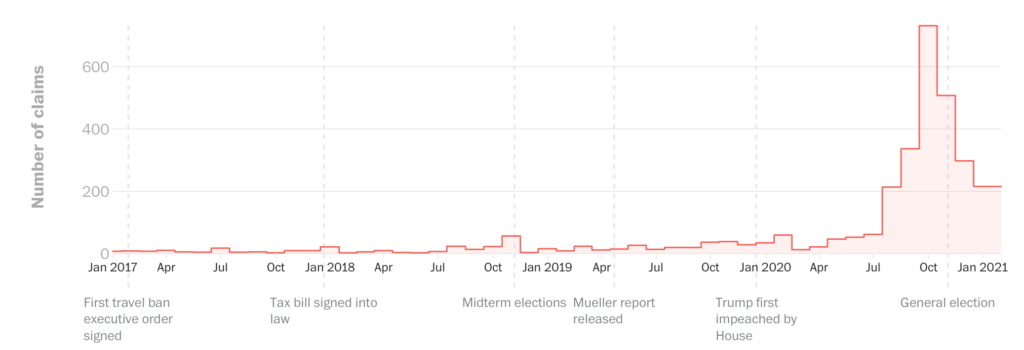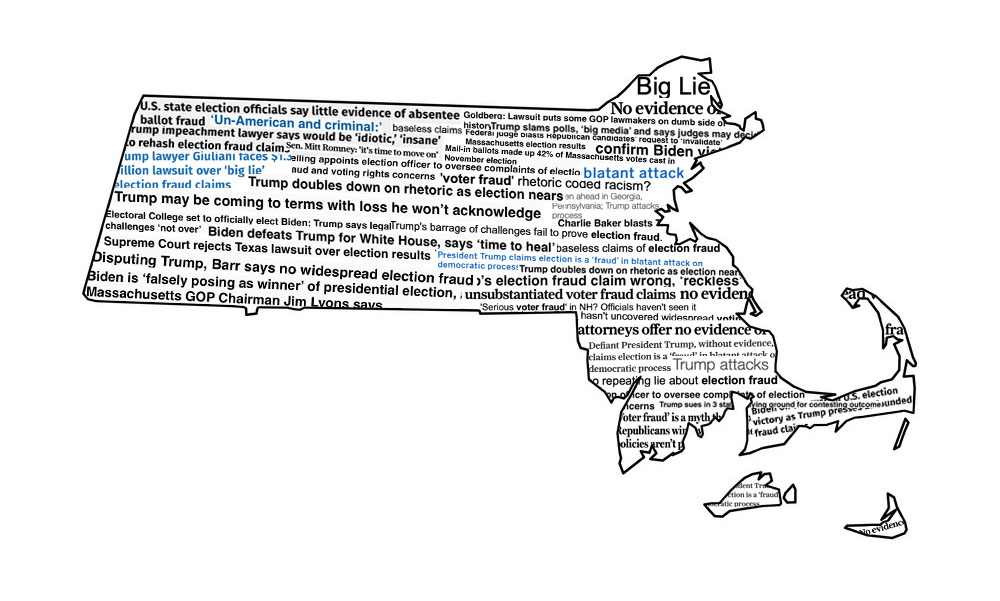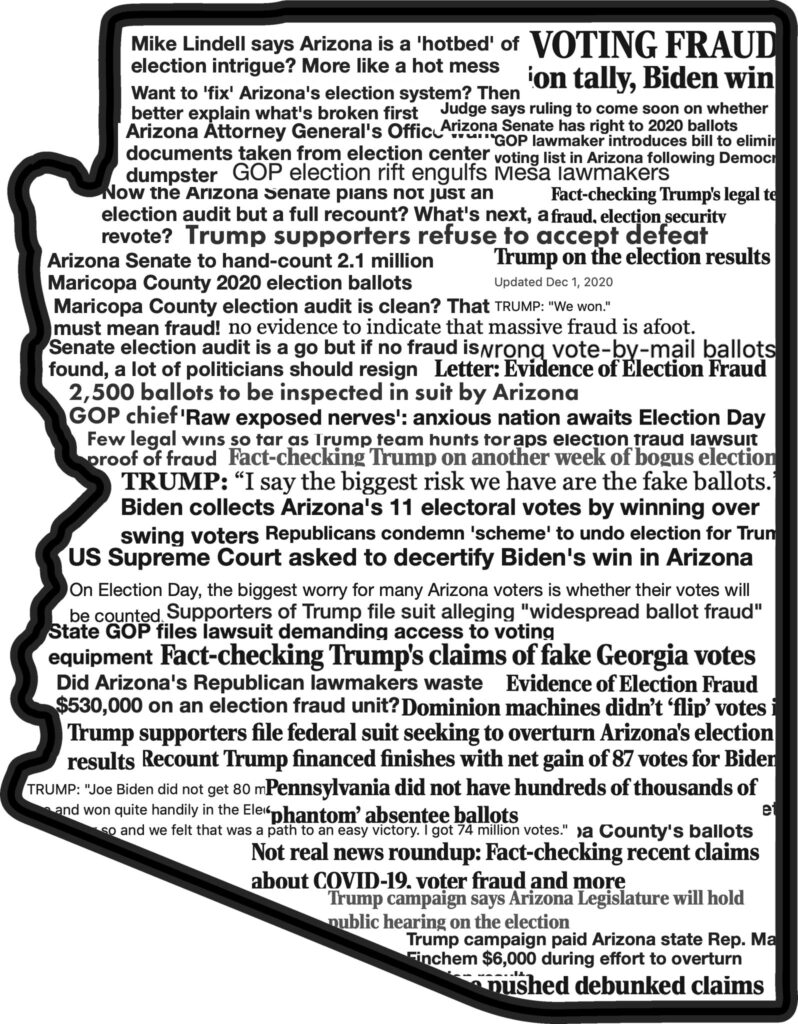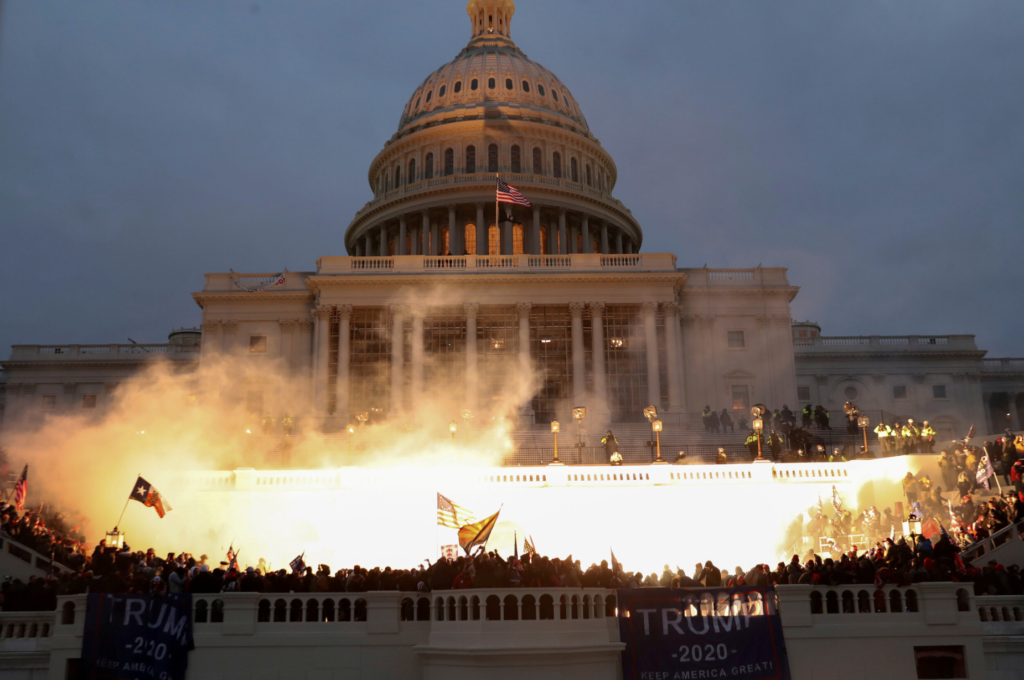Political polarization divides the United States; the media plays an important role in this division as it can publicize and promote polarizing opinions on either side. The election fraud debate during the 2020 election epitomized this polarization; the country split between those who believed and discredited former president Trump’s claims of a stolen election.

Massachusetts: Critical of Election Fraud Accusations

Metro Boston, The Boston Herald, The Boston Globe, The Republican, The Patriot Ledger, The Eagle-Tribune, The Lowell Sun, The Cape Cod Times, The Berkshire Eagle, and The Telegram & Gazette.
A keyword search of “election fraud” in the top 10 Massachusetts local newspapers in the weeks surrounding the election gave little to no credibility to former President Trump’s lies. In a state in which nearly 66% of voters supported Biden in the 2020 election, local newspapers blatantly critiqued false claims of election fraud, using rhetoric such as Trump is “attacking” democracy with his false claims.
Kentucky: Fear Mongering with Concerns About Voting

This same keyword search of local newspapers in Kentucky, a state where 62.1% of voters supported Donald Trump in the 2020 election, had a prominent presence of fear of voter fraud prior to the election. References to President Trump’s claims of election fraud were not prefaced with discrediting rhetoric but rather were stated as indisputable facts. Additionally, cases of “lost ballots” across the country were referenced numerous times across all the newspapers. Fear mongering through voicing concerns with the legitimacy of the political process were prevalent in these articles.
Arizona: Mixed Messages

This same keyword search of “election fraud” of local newspapers in Arizona, a swing state where 49.36% of voters supported Joe Biden and 49.06% of voters supported Donald Trump in the 2020 presidential election, has a solid mix of articles affirming election fraud claims and articles adominishing former President Trump’s lies. For every article instilling fear about the illigitmacy of the election, there were two articles discrediting these claims. Overall, there was more doubt from Arizona media sources on the legitimacy of former President Trump’s claims rather than the legitimacy of the voting process.
What are the implications of the media’s influence on public opinion?

The influence of the media spreading former president Trump’s false claims of election fraud was deadly. These lies incited an insurrection on the US capital which resulted in five deaths and more than 140 injuries. Out of the three states included above, five Massachusetts residents, four Arizona residents and thirteen Kentucky residents have faced various charges for their actions at the insurrection on January 6th as of May 3rd. The fact that there were more than double the number of arrests of Kentucky residents, the state with the most articles on and the strongest support of former President Trump’s claims, than the other two states which were less declaratives in their articles regarding election fraud, suggests the importance of the media’s influence on the actions of individuals.
Public opinion is “the great engine of democracy” (Shapiro, Dempsey, 1987). Yet American freedom of speech allows media sources to spread biased information and to “provide priorities, not just information” (McCombs, 2014). The former president’s lies undermining faith in the voting process fractured the media in partisan and geographic ways. The small rhetoric changes across the different states’ local newspapers exemplify the media providing political priorities rather than information. Though each of these states’ constituents have differing reasons for their political preferences and actions, the discrepancy in the media between these three states and the actions of the state residence shows the power of media influence over public opinion, and how that can influence voting in presidential elections.
Sources:
- Page, B., Shapiro, R., & Dempsey, G. (1987). What Moves Public Opinion? The American Political Science Review, 81(1), 23-43. doi:10.2307/1960777
- Gitlin, T. (1978). Media Sociology: The Dominant Paradigm. Theory and Society, 6(2), 205-253. Retrieved March 1, 2021, from http://www.jstor.org/stable/657009
- McCombs, M. E. a., & Ebook Library issuing body. (2014). Setting the agenda : Mass media and public opinion / maxwell McCombs
- Staff, NPR. “The Capitol Siege: The Arrested And Their Stories.” NPR, NPR, 26 Mar. 2021, www.npr.org/2021/02/09/965472049/the-capitol-siege-the-arrested-and-their-stories.